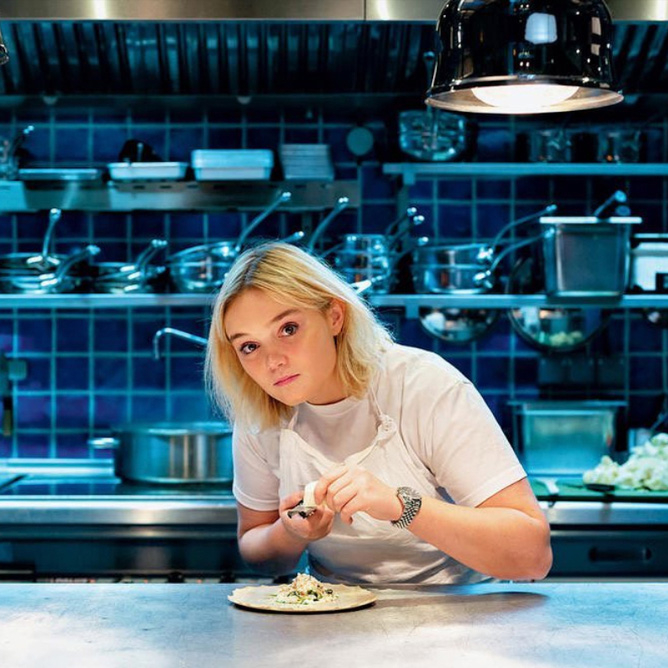“Now that it’s over, I realize even something as awful as the quarantine gave me a gift,” says chef Alexia Duchêne, 24. “When everything stopped, all the hype in my life blew away. Alone and quiet, I had the time to let my ego deflate and see what kind of cooking I really want to do.” Duchêne walked away from her first job at the helm of a kitchen, at Datsha Underground, in early May, because in the uncertain new post-lockdown world the restaurant wanted to change the ambitious prix fixe menu that had won her raves to something much simpler.
This spring, Duchêne’s reputation was rising as perfectly as one of the soufflés she first mastered nine years ago as a precocious student at École Grégoire-Ferrandi, France’s most prestigious professional culinary school. Last May, Duchêne broke out as a new French food-media star during the 10th season of the Gallic edition of Top Chef, and most recently the cherubic chef has been reaping rave reviews for her cooking at Datsha Underground, a speakeasy-style hipster supper club in the Upper Marais that opened in January.
A “super-talented chef who knows how to sublimate simplicity,” crowed critic Ezéchiel Zérah in the national weekly L’Express, while the equally exigent and more reserved Emmanuel Rubin wrote a review entitled “Datsha Underground—The Punch of Alexia ‘Baby Face’ Duchêne” in Le Figaro, the largest French daily. Rubin’s ungainly fight-club boxing metaphors aside, he praised Duchêne’s cooking as “direct and appealing” and commended her for “sending out her plates with the rhythm of a jab.”
By early March, Datsha Underground had reached the top of my go-to list as a Paris-based restaurant critic and food writer. I had a table booked for dinner on March 18 and was looking forward to discovering Alexia Duchêne’s lavishly lauded cooking.
Girl, Interrupted
Then, on March 14, the French government abruptly ordered all restaurants and cafés to close indefinitely as part of a nationwide effort to stop the spread of the coronavirus. From March 17 onward, all residents were also officially instructed to isolate at home. Alexia Duchêne’s world shrank to the size of a saucepan, or the 375-square-foot apartment where she lives on the Left Bank in the Fifth Arrondissement, and I went from dining out 10 times a week to wearing an apron and crying onion-induced tears twice a day at home in the Ninth Arrondissement.

Within a week of the restaurant cataclysm, though, the Paris food world was simmering with new ways to digest this shock. Many chefs started posting recipes on Instagram feeds, and some restaurants converted to home-delivery menus. These include restaurant groups such as Alain Ducasse’s and individual chefs like Stéphanie Le Quellec, who won two Michelin stars this year for her excellent new place, La Scène. (F.Y.I., her heat-and-serve fricassee of chicken with morel mushrooms and green asparagus is the sumptuous edible equivalent of a Loro Piana cashmere sweater.)
I went from dining out 10 times a week to wearing an apron and crying onion-induced tears twice a day at home in the Ninth Arrondissement.
Alexia Duchêne didn’t go either of these routes, but she did agree to create a menu for Ona, a gastronomic start-up that “creates ephemeral food experiences … and empowers the creativity of young chefs.” Despite a mission statement that reads like something lifted from the newsletter of a mega-church in a Sunbelt state, I immediately clicked Order when I saw Duchêne on the site.
When the 60-euro kit arrived on a recent Friday afternoon in a wooden crate decorated with a tangle of raffia, it contained most of the pre-measured ingredients necessary to prepare a three-course meal for two. The menu: grilled leeks with chopped oysters and tarragon-buttermilk dressing; spaghetti with bottarga, peperoncino, and capers; and Fontainebleau (a soft whipped cheese) with kiwi, sorrel, and olive oil. An e-mail that morning contained links to download the recipes and a video of Alexia Duchêne demonstrating them.
On camera, she was a charming teacher—precise but fun and puckish, and her food was superb. Recently, I talked to her about how her career had been sideswiped and what the new normal of the French restaurant will look like now that they are are gradually reopening.
“Everything will change,” Duchêne predicts. “It’ll be B.C. and A.C. (Before and After Coronavirus). Many restaurants won’t survive. Chefs will also need to understand that because everyone’s had to go back into their kitchens again, they’ve realized anyone can cook. It’s not rocket science. So the food world will have to come down to earth again, get humble and simple, and stop taking people for a ride,” she said in fluent English. (Her mother is English, her father French, and she grew up in Paris.)
“It’s also time for a new style of French cooking,” says Duchêne. “La bistronomie (modern French-bistro cooking) has gotten stale and isn’t evolving anymore. I’m more triggered by the food in London, New York, and California, because Paris is still kind of straitjacketed. In New York, I love places like Blanca, Wildair, Contra, and Estela—their food is fantastic, and a meal at these places is also a really good time. We need more places like this in Paris. The service in the hip young places in France also has to change, because often it’s too stiff, and they ignore you on purpose. I’m kind of looking forward to some new and improved post-corona friendly service in Paris,” she says with a chuckle.
“The food world will have to come down to earth again, get humble and simple, and stop taking people for a ride.”
Pre-dating the virus-induced home-cooking boom, she’d been working on a “straightforward book about how to cook exciting food at home,” she says. “Mostly main courses with a garnish and a condiment—nothing with hard-to-find ingredients, just dishes that have a lot of relief in their flavor profiles, because the contrasts between different flavors—sour, salty, sweet—are what make food interesting. You know, the way tastes contrast and ricochet around in your mouth. This is more appealing and modern to me than melding ingredients together to create a single taste. For me, sour is sweet and modern.” Duchêne’s book will be published in French by Marabout in October.
She is also working on a pilot script for a new English-language television show about food that she plans to shoot in L.A. later this year, and says she wants to do another round of chef-in-residence stints like those she’s done with chef Gregory Marchand at Frenchie Covent Garden, in London, and at Chardon, in Arles, but this time in New York, and maybe Mexico, once it’s possible to travel again.
“Even before corona, it was countries with a tradition of immigration like the U.K. and the U.S. that were having the biggest influence on the way we’re eating during the 21st century—you know, all of these cool overlaps between different kitchens and experimenting with unfamiliar ingredients. This is what I love about California. Someday I’d really like to open a restaurant in Los Angeles or San Diego—there’s so much to be done there,” says Duchêne.
With travel restrictions still in place, food-lovers locked up in cities like Philadelphia and San Francisco might be pining for Paris, but for one astute and ambitious young chef in the French capital, it’s a little bit of California dreaming that’s getting her through the lockdown nights.
Alexander Lobrano is a writer and restaurant critic. His most recent book is the second edition of Hungry for Paris: The Ultimate Guide to the City’s 109 Best Restaurants


